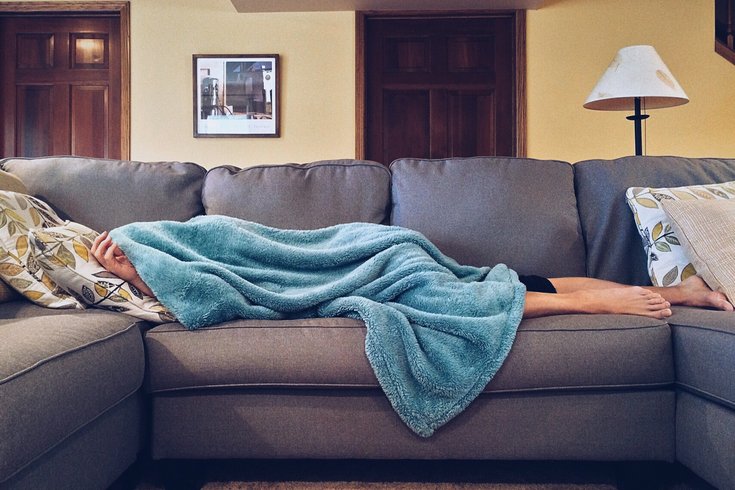
August 30, 2018
 Pixabay/for PhillyVoice
Pixabay/for PhillyVoice
Before you snatch your pillow and blanket and head for the couch, know that there is hope.
The 1952 Popeye short, "Shuteye," a slumbering sailor and resident mouse beautifully illustrate the challenges of sharing sleeping arrangements with a partner who snores. Popeye’s bellowing breathing is loud enough to pull drawers out of a dresser and wake an adorable resident rodent asleep in a comfy matchbox bed. As is the case with animated altercations of the time, high jinks ensues and the miffed mouse proceeds to push Popeye out of a window.
Those who have been regularly awoken in the middle of the night to the sounds of their partner’s belabored breathing might be tempted to take the mouse’s aggressive route. But before going to extreme measures, there are plenty less extreme solutions out there that don’t involve a fall from a second-story window, or a bulky breathing apparatus.
While snoring doesn’t discriminate based on age, gender or weight, there are several factors that come into play, some more obvious than others. Alcohol consumption, smoking, allergies, and eating large meals close to bedtime can all lead to snoring, which is why professionals dealing with symptoms of snoring are all on board with promoting a healthy lifestyle.
Cara O. Frank, founder of Six Fishes Chinese Medicine takes a holistic approach with her patients.
“In Chinese medicine, we’re thinking about phlegm,” she says, not mincing any words.
“Overeating, excess in food and drink – these factors compromise the flow of blood, leading to stagnation and causing inflammation and phlegm.”
Frank goes on to explain that often times snoring can be a product of stress resulting in something called plum pit qi, a sensation that something is caught in one’s throat.
Her treatment methods combine customized herb blends and acupuncture to balance the body, invigorating the blood to increase circulation and improve the condition of the throat.
At Bella Vista Family Chiropractic, Chelsea McLean takes a whole body, holistic approach with her patients.
“When making adjustments, it’s to help the brain talk to the body better,” she explains.
This mind-body connection helps respiratory and nerve systems reopen and ease irritations to the muscles in the mouth, throat and in air passages. McLean’s success with snoring hits close to home.
“My husband is a good example, getting adjusted helped him with his snoring,” she says.
“Now he sleeps better and deeper.”
Dr. Don Sesso of the Pennsylvania Snoring and Sleep Institute evaluates patients based on their symptoms and how those symptoms effects their partners before deciding on a course of action.
“The good news is that there are a lot of different treatments,” he says.
Sesso has had success with everything from the simplest tweaks, including changing sleeping positions and using body wedge pillows to some creative DIY solutions. Sewing halved tennis balls into the back of one’s pajamas is one way to deter those who snore while sleeping on their backs.
When making adjustments, it’s to help the brain talk to the body better.”
“It’s not the most comfortable thing, but it works!”
Mouth guards, either custom made or over-the-counter can counteract snoring.
“It’s not invasive or painful, but it is something you do have to wear every night,” Sesso says.
When physical changes to sleeping routines don’t do the trick, Dr. Sesso recommends heading to an ear, nose and throat doctor to discuss the possibilities of allergies, blockages or deviated septums.
In extreme cases, surgery is necessary, but before that, there are outpatient procedures to be considered. Somnoplasty uses radio frequency to tighten the tissue around the back of the tongue and snoreplasty injects a stiffening agent into the upper palate, both greatly reducing the vibrations that cause snoring.
There is an alternative snoring therapy that’s caught Dr. Sesso’s eye. As it turns out, learning to play the indigenous Australian instrument known as the didgeridoo can strengthen muscles and decrease or even eliminate snoring.
“The amount of time you have to do it was on the onerous side, so even if it helps, it’s not the most practical.”